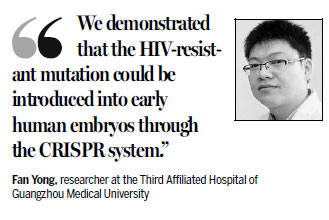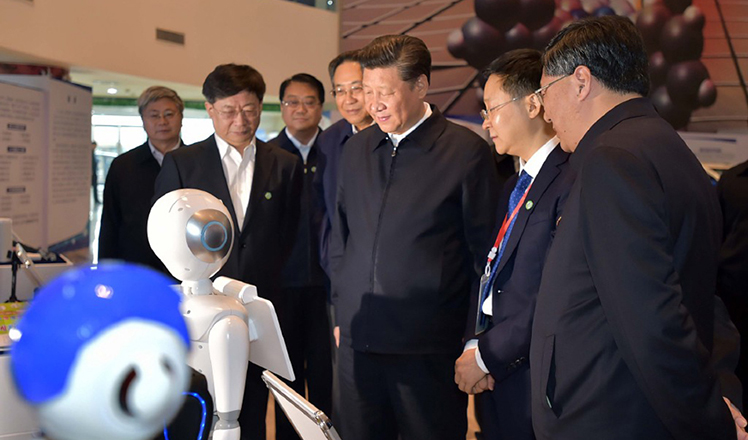Experiments envision HIV immunity
Updated: 2016-04-27 08:07
By Xu Jingxi / Cheng Yingqi(China Daily)
|
||||||||
Chinese scientists are working on new projects inspired by the documented case of a man who was cured of AIDS. They hope eventually find a way to ensure that humans are born with immunity to the disease.
Nine years ago, a 41-year-old man, who has since been dubbed the "Berlin patient", was close to death and in the advanced stages of both AIDS and leukemia. Doctors gave him a stem cell transplant from an HIV-resistant donor, and miraculously cured both conditions, making him arguably the first person ever to be cured of AIDS.
The remarkable case shed light on CCR5 - a receptor in humans that helps HIV enter cells. The bone-marrow transplant had changed the Berlin patient's gene to a mutation called CCR5-delta32, which blocks HIV.
With new gene technologies now available, Chinese scientists have recently moved forward with attempts to modify the CCR5 gene in embryos, advancing their drive to ensure humans are born already immune to HIV.
In the latest case, researchers from the Third Affiliated Hospital of Guangzhou Medical University used a gene editing technique named CRISPR/Cas to attempt to replace the CCR5 gene in 26 human embryos. The researchers tried to give the embryos the HIV-resistant mutation. Four embryos were successfully edited, while the other 22 cases failed to produce the desired results.
The research was reported in the Journal of Assisted Reproduction and Genetics.
"In this study, we demonstrated that the HIV-resistant mutation could be introduced into early human embryos through the CRISPR system," said Fan Yong, a researcher at the institution and an author of the paper.
The CRISPR/Cas gene editing technique, better known as the "molecular Swiss army knife", is a technology developed by US scientist Jennifer Doudna and French scientist Emmanuelle Charpentier in 2012.
Since then, scientists around the world have been using the technology to edit animals' genes in the laboratory.
Huang Junjiu, a biologist at Sun Yat-sen University in Guangzhou, was the first to try the technique on embryos. He reported his experiment on 71 embryos in Nature magazine in April 2015.
Despite the fact that Huang's team used embryos collected from fertility clinics that could not have progressed to live births, their work sparked a global debate on the ethics of such research.
In December, representatives from more than 20 countries gathered for a meeting organized by scientists from China, the US and the UK to discuss these ethical issues.
"Our experiments have gone through an ethical review at our hospital. Unlike the UK, China currently does not have a government authority that accepts and examines applications for this kind of research," Fan said.
Scientists also tried to use CRISPR/Cas as a "molecular knife" therapy to cut off HIV within cellular DNA. But a study published in the US journal Cell earlier this month found that the virus can quickly develop resistance to the gene editing technique.
Contact the writers at xujingxi@chinadaily.com.cn

- EU pledges 20 mln euros to nuclear safety fund
- DPRK seems set to launch Musudan ballistic missile
- Austria far right freezes out coalition in presidency race
- Chernobyl's 30th anniversary: Living under radiation
- S. Korea denounces DPRK's missile test
- Saudi-led coalition says kills more than 800 al-Qaida militants in Yemen

 Human-like robots say 'hi' to President Xi
Human-like robots say 'hi' to President Xi
 Animals turn savvy earners from entertainers
Animals turn savvy earners from entertainers
 Slackline walker conquers Tiger Jumping Gorge
Slackline walker conquers Tiger Jumping Gorge
 Top 6 domestic new-energy vehicles at Beijing auto show
Top 6 domestic new-energy vehicles at Beijing auto show
 30th anniversary of the Chernobyl nuclear disaster marked
30th anniversary of the Chernobyl nuclear disaster marked
 Shanghai unveils Disney-themed plane and station
Shanghai unveils Disney-themed plane and station
 Hebei's poverty-stricken village gets new look after Xi's visit
Hebei's poverty-stricken village gets new look after Xi's visit
 Cooks get creative with spring food exhibition in central China
Cooks get creative with spring food exhibition in central China
Most Viewed
Editor's Picks

|

|

|

|

|

|
Today's Top News
Liang avoids jail in shooting death
China's finance minister addresses ratings downgrade
Duke alumni visit Chinese Embassy
Marriott unlikely to top Anbang offer for Starwood: Observers
Chinese biopharma debuts on Nasdaq
What ends Jeb Bush's White House hopes
Investigation for Nicolas's campaign
Will US-ASEAN meeting be good for region?
US Weekly

|

|







